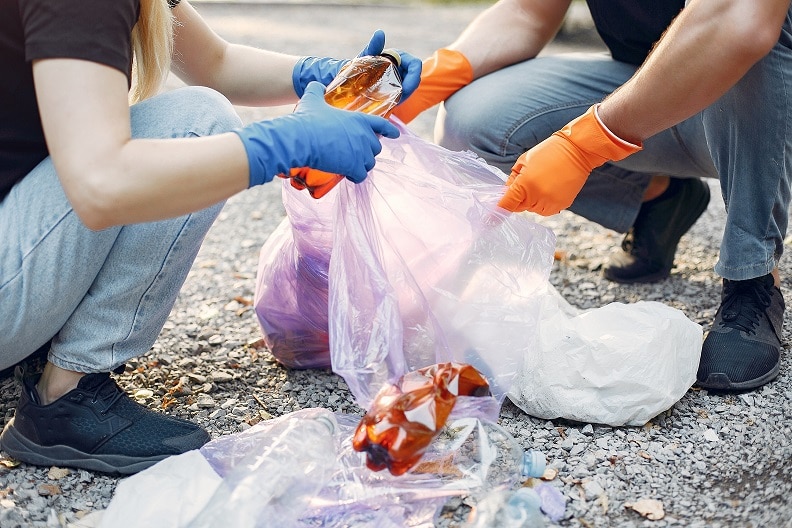An average Australian generates about 1.5 tonnes of rubbish in a year. Most of this rubbish is from disposable plastics and green waste. While council bins are widely available throughout residential areas and households could just let their rubbish sit by the curb and wait for collection day, letting your garbage sit outside could lead to potential health risks.
On the other hand, there are ways to avoid these risks – here are seven health-related facts about rubbish that you should know for awareness of the underlying dangers of your everyday rubbish.
Microplastics have Adverse Health Effects
Microplastics are plastic particles that are smaller than five millimetres (5mm) and are commonly used in cosmetics and toothpaste. Most of these particles end up in oceans, constantly exposing them to UV radiation that breaks the microplastics into smaller pieces. These are then eaten by marine life which eventually ends up at our markets.
Plastic additives such as phthalates that break down into microplastics raise a concern about health risks. Many additives, such as Bisphenol A (BPA) make plastic transparent but is shown to interfere with testosterone hormones. Diethylexyl Phthalate (DEHP) is an additive that increases plastic flexibility but it may cause cancer.
Rubbish Breeds Microorganisms that Cause Diseases
Green waste and poorly segregated rubbish, particularly exposed in warm and damp weather, are good habitats for bacteria and viruses. If you come in contact with the filthy rubbish and unconsciously touch your face, hold your food or touch somebody else, you risk yourselves and your family from serious diseases caused by these bacteria and viruses.
Bacterial diseases include:
- Salmonellosis
- Shigellosis
- Staphylococcal food poisoning
- Skin infections
- Tetanus
Viral diseases include:
- Trachoma
- Gastroenteritis
- Hepatitis A
- Encephalitis
Parasitic Diseases include:
- Hookworm
- Roundworm
- Threadworm
Additionally, insects and pests are highly attracted to rotting food and piles of rubbish, thus, they become vectors of diseases and viruses. Disinfecting your household is a good habit, but it is essential to tend to your garbage frequently and make sure all of it is properly disposed of.
Exposure to Landfills Influence Birth Weight and Cancer Risk
International studies suggest that reproductive effects associated with landfill sites include low birth weights, even worse as fetal and infant mortality. Furthermore, geographical comparative studies have investigated cancer mortality and incidence around active waste sites.
The results imply the increased frequency of cancers, particularly stomach, colon, and rectal cancer, around hazardous waste sites. While these studies lack chemical release data, it suggests that residences near hazardous rubbish tips are more exposed to several health risks than those living away from landfills.
Gases Produced by Rubbish Causes Illnesses
Heaps of rubbish overflowing the council bins aren’t only eyesores but they also emit harmful gases such as ammonia and sulfides that cause short to long-term health effects. This includes headaches, insomnia, lung irritation, as well as severe chest pain. Similarly, the rubbish you dump produces massive amounts of greenhouse gases such as methane – contributing to the ever-increasing global warming.
E-Waste Contains Hazardous Chemicals
Exposure to chemicals that are present in your electronic waste can result in severe to fatal health hazards. Pollutants from e-waste such as lead, cadmium, and mercury, can contaminate your body through inhalation, skin absorption, or ingestion.
Chemicals in e-waste cause the following health hazards:
- Developmental problems
- Interference with Regulatory Hormones
- Skin ailments
- Asthmatic bronchitis
- Muscle weakness
- Kidney damage, etc
Toxic Substances are Found in Old Furniture
In order for a piece of wooden furniture to withstand the tests of time, manufacturers and households use lacquers, wood varnish, and paints to preserve the durability of the material. However, many of these liquids contain phthalates which are linked to asthma, attention-deficit hyperactivity disorder, breast cancer, and male fertility among other adverse effects.
In addition, Volatile Organic Compounds (VOC) are emitted by paints, lacquers, and cleaning solutions as gases that cause eye, nose, and throat irritation. VOCs can also cause loss of coordination and nausea if exposed to higher doses and, worse – can lead to liver and kidney damage and the central nervous system. Finally, sharp pieces of broken furniture can cause mild to severe wounds and tetanus.
Overflowing Rubbish Contaminates Water Supplies
If you pile your household rubbish on your lawn and wait for the weekly collection truck, the liquid wastes and other rubbish can seep into underground waterways and can negatively change the chemical composition of water. This likely happens after heavy rain and can result in contaminated potable water, thus exposing us to various health risks.
Furthermore, water pollution caused by household rubbish also contaminates marine life. Used batteries, paints, and other hazardous household rubbish can be particularly harmful to surface waters. However, all of these health risks and environmental hazards posed by household and commercial rubbish can be minimised.
The Solution
There are many smart waste management techniques that you can apply to your homes to eliminate rubbish-related health hazards. After all, it’s the little things that count – and it starts when we choose to minimise our waste and walk the talk.
Proper segregation and disposal of your rubbish is one step for a good cause. This is where Paul’s Rubbish Removal can help – we are committed to taking out your garbage all around Sydney and diverting as much of it from landfills as possible. Our network of composting and recycling facilities that are compliant with NSW EPA standards ensures that your rubbish will go a long way.
Paul’s is also committed to sharing our knowledge of efficient waste management and effective recycling techniques so you get value for your worth. We value your health as much as you do and are willing to discuss it with you.
Set a booking with our friendly staff at 0407 125 125 or email us for inquiries and a free quote.







